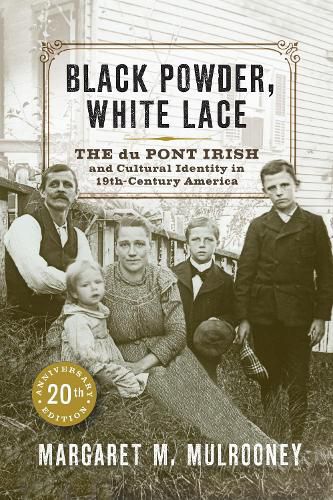Readings Newsletter
Become a Readings Member to make your shopping experience even easier.
Sign in or sign up for free!
You’re not far away from qualifying for FREE standard shipping within Australia
You’ve qualified for FREE standard shipping within Australia
The cart is loading…






Twenty years ago, Margaret Mulrooney’s history of the community of Irish immigrant workers at the du Pont powder yards, Black Powder, White Lace, was published to wide acclaim. Now, as much of the materials Mulrooney used in her research are now electronically available to the public, and as debates about immigration continue to rage, a new edition of the book is being published to remind readers of the rich materials available on the du Pont workers, and of Mulrooney’s powerful conclusions about immigrant communities in America. Explosives work was dangerous, but the du Ponts provided a host of benefits to their workers. As a result, the Irish remained loyal to their employers, convinced by their everyday experiences that their interests and the du Ponts’ were one and the same. Employing a wide array of sources, Mulrooney turns away from the worksite and toward the domestic sphere, revealing that powder mill families asserted their distinctive ethno-religious heritage at the same time as they embraced what U.S. capitalism had to offer.
$9.00 standard shipping within Australia
FREE standard shipping within Australia for orders over $100.00
Express & International shipping calculated at checkout
Twenty years ago, Margaret Mulrooney’s history of the community of Irish immigrant workers at the du Pont powder yards, Black Powder, White Lace, was published to wide acclaim. Now, as much of the materials Mulrooney used in her research are now electronically available to the public, and as debates about immigration continue to rage, a new edition of the book is being published to remind readers of the rich materials available on the du Pont workers, and of Mulrooney’s powerful conclusions about immigrant communities in America. Explosives work was dangerous, but the du Ponts provided a host of benefits to their workers. As a result, the Irish remained loyal to their employers, convinced by their everyday experiences that their interests and the du Ponts’ were one and the same. Employing a wide array of sources, Mulrooney turns away from the worksite and toward the domestic sphere, revealing that powder mill families asserted their distinctive ethno-religious heritage at the same time as they embraced what U.S. capitalism had to offer.